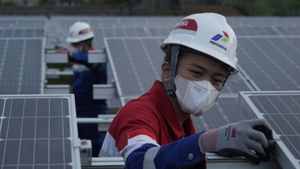JAKARTA - Indonesia is faced with the shadow of a recession that is expected to occur in 2023.
In the midst of inflation and the threat of recession, education related to financial health for the younger generation is increasingly crucial.
Co Founder of the Money Exchange platform, Felicia Putri Tjiasaka said, instead of being afraid, people should plan their finances and check up on financial health.
"Before we start preparing, we should first check where our financial situation is so that we can decide what to do next," said Felicia when met in Jakarta, Friday, October 21.
For those who already feel that their financial situation is in a good position, said Felicia, the preparations that should be made to deal with the recession are through five ways, namely first, throwing away the understanding of Fear of Missing Out (FOMO).
"You don't have to rush to sell stocks when you are down or in a hurry to buy them when you're above. Just save them regularly as usual. You don't need FOMO," he said.
The second tip, Felicia suggested that people start to strengthen their emergency funds. According to him, the amount of emergency funds is adjusted to the condition of each person taking into account income, monthly expenses.
"Those who are still single may be different from those who are married. Add 50 to 100 percent of the normal amount. Or you can just put it in the money market mutual fund or retail SBN, those are two products that are anti- recession," he continued.
The third is to apply the concept of frugal living by reducing expenses and determining financial priorities and prioritizing needs over desires.
However, despite implementing this concept, one person does not have to reduce their consumption extremally because it will create a recession.
"Saving a living but don't cut spending because it will cause a recession, enough with mindful spending. Don't let food from 3 times to 1 time. It's not excessive but it doesn't get short," added Felicia.
Fourth, taking into account the possibility of interest rates that will continue to increase in the future, Felicia suggested immediately paying off some of the debts that have large interest rates.
"I have a mortgage whose interest is 11 percent at the beginning of the year and maybe in the future it can reach 14 or 15 percent. Pay such high interest does hurt, especially since our investment returns are not necessarily that big. If there is money and does not stabilize cashflow, you should immediately pay some of the debt," he explained.
And lastly, increasing the income tap or doing side work.
The reason, said Felicia, is that in the midst of uncertainty, it will also be overshadowed by the risk of termination of employment (PHK) so that later some people will lose their main source of income.
"There is no loss, we have a lot of income, so we stick with side principles," concluded Felicia.
The English, Chinese, Japanese, Arabic, and French versions are automatically generated by the AI. So there may still be inaccuracies in translating, please always see Indonesian as our main language. (system supported by DigitalSiber.id)













